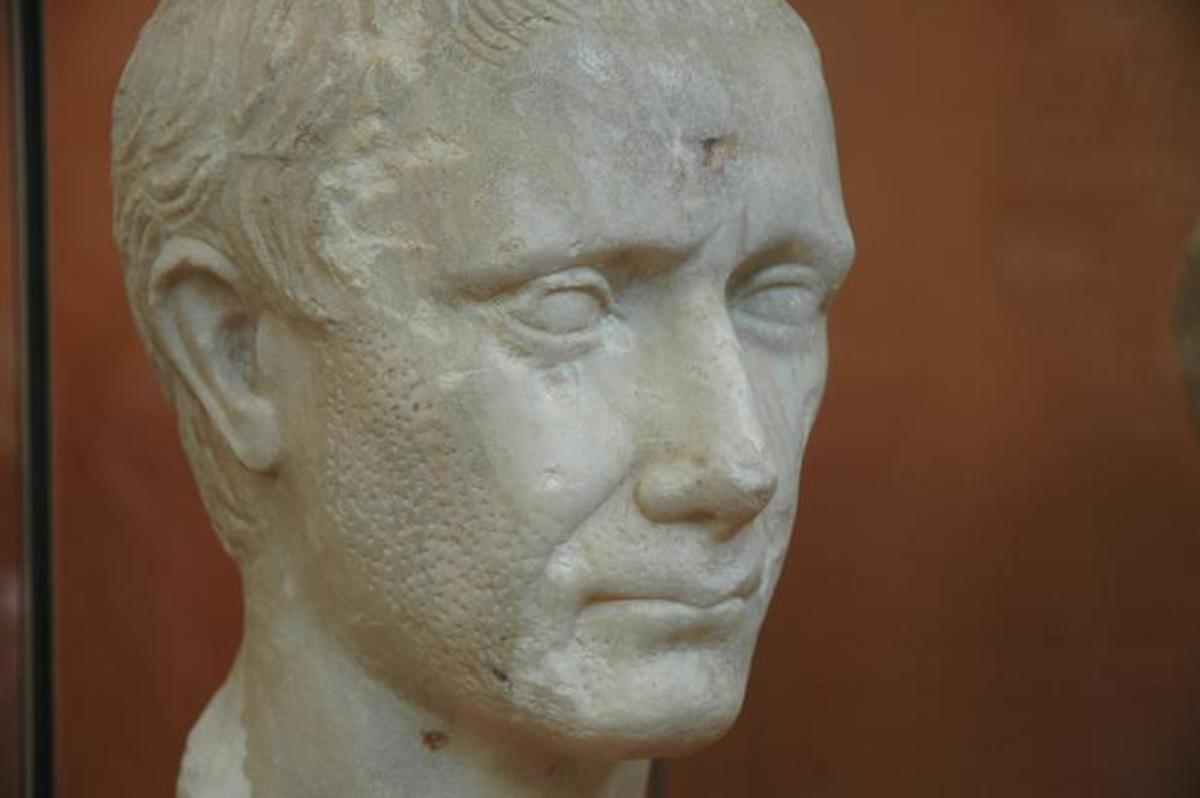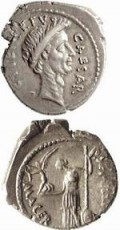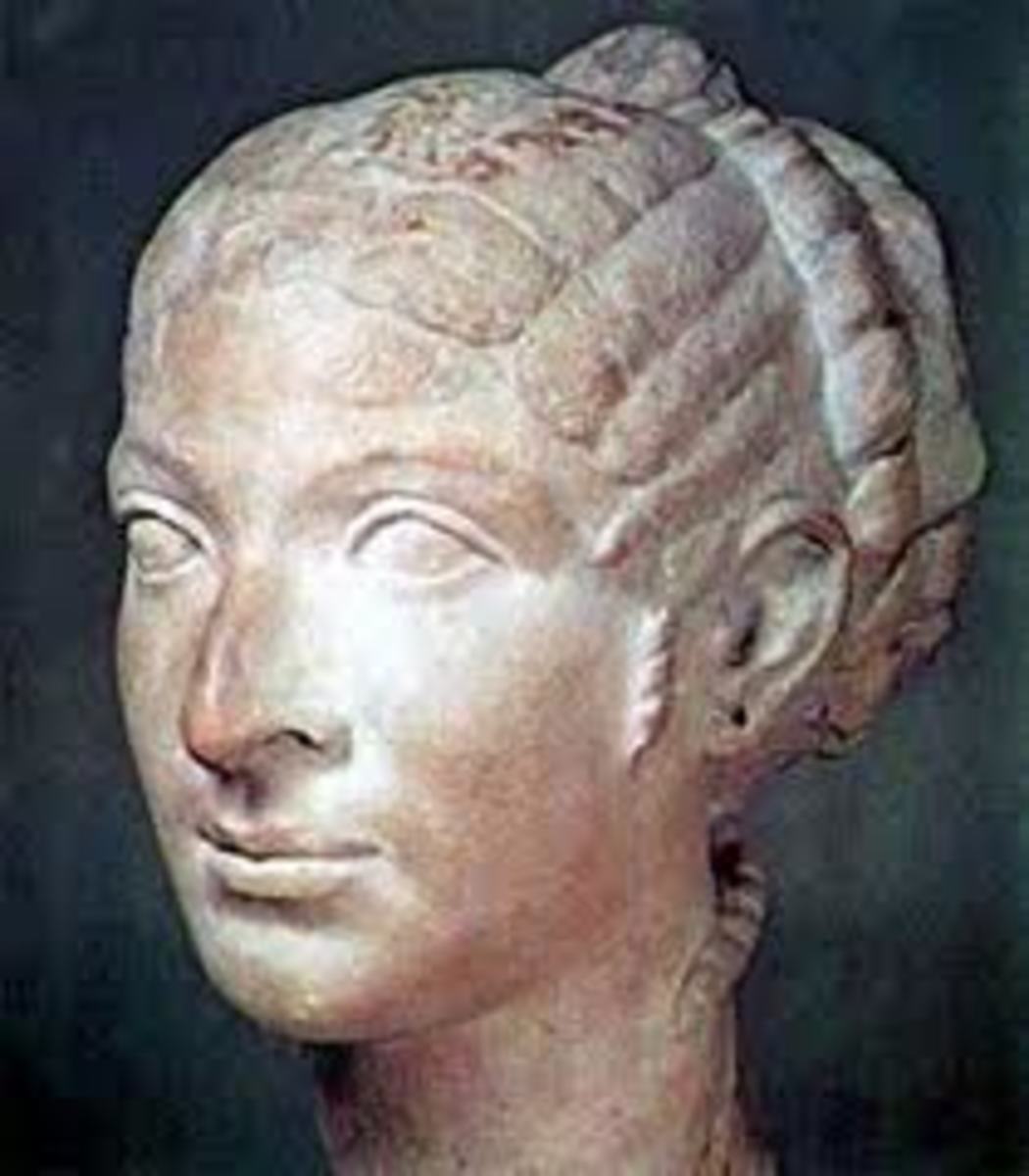Gaius Julius
Aphrodite - Caesar's ancestress?
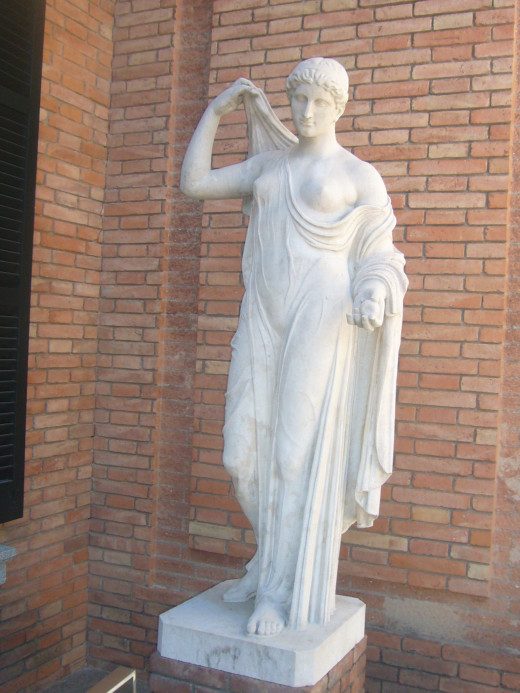
Aphrodite's Progeny
The Roman leader, Gaius Julius Caesar was many things in his lifetime. Priest, writer, orator, soldier, politician and statesman, Caesar almost always excelled at all that he set his mind to or laid his hands on. Not surprisingly, Caesar ranks as, perhaps, the most important Roman who ever lived; certainly he is one of the most influential people the world has been blessed with. Given his larger than life image, it will not come as a surprise that his entire life is peppered with a host of interesting facts, legends and just plain bs.
Caesar was born on July 13 100 B. C., a scion of one of Rome’s most illustrious families, although at the time of his birth the family was quite poor. In a community that was not devoid of illustrious families, Caesar’s family was an interesting one for they claimed descent from divinity. Their reputed ancestor, Iulus, it was said, was a son of Aeneas, the Trojan prince who, as Virgil relates in the Aeneid, was one of the few of Troy’s heroes who escaped with his life when that city was completely destroyed by Agamemnon and his Hellenic host. Aeneas was, reputedly, a son of the goddess of love, Aphrodite, known to the Romans as Venus. From all indications, this explanation of the origins of the Julian gens was fully accepted by the family including Caesar himself, as well as by the generality of Romans.
Untimely Ripped?
It is a fairly widespread belief that Caesar was, in the Bard’s inimitable words in Macbeth, untimely ripped from his mother’s womb and hence the association of his name with procedure whereby a child is removed from the womb by surgical methods rather than through natural birth. In fact, it seems very highly improbable that such was the case.
The procedure described today as a caesarian section had been standard medical practice in Rome well before Caesar was born, but with a slight, though vital, difference. Roman physicians, where a pregnant woman died in her third trimester, would cut the dead woman open in an effort to save the child. However, there is no evidence whatsoever to suggest that the procedure was ever performed on live women; it was done purely on the basis that the fetus in the dead woman’s womb might have a chance of survival notwithstanding the death of the dame. So, the simple fact that Caesar’s mother lived for several years after his birth is strong evidence that his birth came about in the normal fashion.
The link between the procedure which bears the great man’s name and the man himself may be much more prosaic and then, again, maybe not. The common view is that either Caesar himself or one of his successors, who all took his illustrious name for theirs, had made a lex Caesarea, i.e. a law passed by, or under the authority of, Caesar. The lex put what had hitherto been common medical practice on a sound statutory footing. Well enough! However, as with most things that relate to Caesar, there is a slight twist. The Roman historian, Gaius Plinus Secundus (AD 23-79), more generally known as Pliny the Elder, tells that the connection between the procedure and the name goes much farther back in time. It was the procedure, according to Pliny, that gave rise to the name Caesar, and not the other way round. It seems that one of Caesar’s ancestors had been delivered via the procedure and the name Caesar comes from the Latin word caedere, i.e. to cut. If this view is correct, and Pliny is one of the more reliable of the ancient writers, then the lex made by a later Caesar, whether Julius or any one of the host of succeeding Caesars, to regulate the procedure must be considered as a form of honor, belated it is true, to his direct or adoptive ancestor.
Priest
The priesthood in Rome, as in most ancient societies, was a vital public institution and, twice in his lifetime, Caesar was a priest. At the age of 17, he was nominated to the position of Flamen Dialis, that is to say the high priest of Jupiter, the chief deity in the Roman pantheon. This nomination had some purely personal repercussions for Caesar for, prior to his nomination to the position, he had been engaged to be married to one Cossutia, a daughter of a well to do equestrian family that had risen from the plebeian ranks. Now, the chief priest of the chief deity was required to be a patrician, which Caesar was; the chief priest’s wife was also required to be from that same class. Cossutia did not meet this requirement, so, on account of her plebeian origins, the engagement was broken off and Caesar went on to marry Cornelia, a daughter of Lucius Cornelius Cinna (died 84 B.C.), who met the requirements.
His stint as Flamen was a short one. In the perennial disturbances and civil wars that plagued the Roman state at the time, the faction to which Cinna, Caesar’s father-in-law belonged and which faction was led by Caesar’s uncle by marriage, Marius (157-86 B.C.), lost out. Indeed, his father-in-law lost his life and, for a time, Caesar was in grave danger of losing his and he had to go into hiding! However, he refused to divorce his wife and the staunch support of his mother’s family, who were on the winning side, saved him; but he had to give up the Flamenship. Let's hear it for MUMS!
There is an irony in life which, I am certain, Caesar must have thought on in subsequent days. Events that seem disastrous in the now, might actually be a blessing in the then. If things had worked out differently concerning the issue of the Flamenship, Caesar might very well have ended up as a mere footnote in history; his name known only to those eggheads who do nothing else but study the documents of bygone ages. Had he retained the position as Jupiter’s chief priest, Caesar could never have been a soldier for the Flamen Dialis was forbidden from mounting a horse; forbidden from looking upon a battlefield; forbidden from even staying away from his residence for more than three days; indeed, the chief priest could not stay away from the city for more than a single day! It is my humble view that history, and the student of history, was well served when Caesar’s faction lost out at this time.
All things come for those who wait is a fairly commonplace proverb; certainly it did for Caesar. Years after this debacle, in 63 B.C., Caesar was elected to the post of Pontifex Maximus, the supreme head of the state religion. It is important to note that the position of Pontifex had more of a political import than a religious one; nonetheless, it was still the supreme office of the Roman priesthood; Caesar was a priest second time around.
It was during his term as Pontifex that he carried out one of the most important tasks in world history: he reformed the Roman calendar and set out the basic form of the calendar (the western calendar, that is) that the world uses till this day. The reformation of the calendar was a vital task that Roman statesmen knew had to be done but, basically because of a lack of political will, it had been left undone. Caesar faced the task and carried it out with his customary vigor. Inviting one of the foremost minds of the day, Sosigenes, the Greek professor of astronomy at Alexandria’s (Egypt) famed university, the Julian calendar established the solar year, 365 days, as the standard with a leap year, 366 days, every fourth year. In the words of Pliny the Elder, Caesar brought the years back into conformity with the course of the sun. This basic format, apart from some fine tuning tweaking by Pope Gregory XIII in 1582, has served the world just fine since 63 B.C. For this outstanding piece of work, the month of his birth was renamed in his honor. Let’s hear it for July! This signal piece of work would be more than sufficient for the average Joe, but Caesar was, if nothing else, considerably more than average.
Gaius Julius Caesar
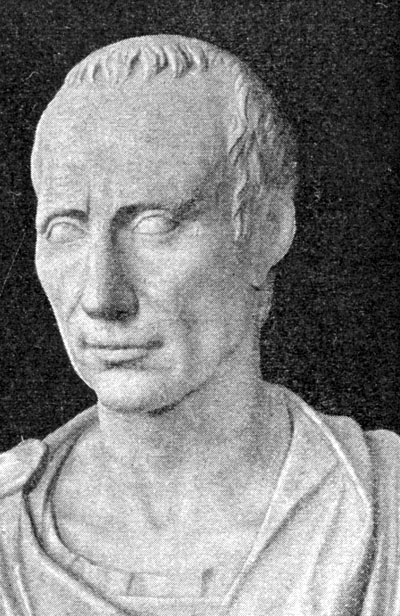
Whom do you think the best soldier?
Soldier
His removal from the post of Flamen Dialis was extremely fortuitous for Caesar, for it allowed him to embark upon a career the success of which resounds more than two millennia after: soldier! It is not too much to say, in my humble view, that he will continue to be regarded as soldier par excellence in millennia to come. As a strategist and tactician, Caesar certainly ranks with other such greats as Sun Tzu (c. 6th century B.C.), Alexander (356-323 B.C.) whom Caesar revered, Genghis Khan (c. 1162-1227), and Napoleon (1769-1821). As the Bard aptly puts it, he bestrode the world as a colossus. Even in his own lifetime, his military exploits had become the stuff of legend, subtly aided by brilliant written exposes; but, more of the writing in a bit.
One example will suffice to show Caesar’s ability as a soldier. In the contest for supremacy between Caesar and Pompey (106-48 B.C.), at an encounter at Dyrrhachium, in what is now Albania, on 10 July 48 B.C., Pompey, with a vastly superior army had Caesar practically defeated. He failed to take his opportunity. In Caesar’s own words, the enemy had the battle won, if only they had someone who was prepared to accept the victory! Just a month later, on 9 August, Caesar turned the tables at Pharsalus in Thessaly, Greece. Still facing an army that significantly outnumbered his about two to one, the skilful use of his reserve resulted in a resounding victory. Pompey, whom contemporaries considered to be no mean soldier himself, had his army totally dispersed! If contemporary reports are to be believed, Caesar lost just 230 killed while Pompey’s losses were 15,000 killed and 24,000 captives!
Writer Par Excellence
Two titles, The Gallic Wars, (7 volumes, each volume covering a year of Caesar's campaign in Gaul and Southern Britain), and The Civil Wars (Caesar's perspective on the turmoils that embroiled Rome up to the death of Pompey) are definitely attributed to Caesar.
The Gallic War, in particular, is considered a model of clear and direct Latin style. The volumes were written and published during or just after a campaign and they played a vital role in keeping Caesar in the minds of his fellow citizens when he was away from Rome for extended periods on military duty.
Writer, Orator
For anyone who has even an inkling about life in the Rome in which Caesar lived, the name Cicero (106-43) is one that resounds. Amongst a people who took pride in the written and spoken word, Cicero was the undoubted master of rhetoric and style. That Cicero considered Caesar’s oratory and prose to be of the highest order, I think, says it all. Cicero openly declared that he could not rate any orator as superior to Caesar and, even today, no comprehensive study of Latin can be done without studying the master’s writings. Always concise and to the point, Caesar was……, what the heck; veni, vidi, vici, I think, says it all.
Private Life
The private lives of public folk has always being of interest to us onlookers, and in his private life Caesar does not disappoint. Caesar became the head of his family at the age of 16, following the sudden death of his father; the old gentleman having keeled over and died as he was putting on his shoes one morning. A heart attack, we’d call it, but then we all die because our hearts are attacked, one way or the other. The only son, Julius had two sisters, both older than him and both named Julia (Romans being very parsimonious when it came to names) as were his paternal aunt and his own daughter. Little is known of the older sister, Julia Caesaris Major, but the younger of the two, Julia Caesaris Minor (101-51 B.C.) was grandmother to Octavian, who became Augustus.
As we saw above, Caesar’s married Cornelia the year after his father’s death in pursuance of his career; Cornelia died in 69 B.C. two years later, in 67 B.C., he married Pompeia, a grand daughter of Sulla (138-78 B.C), the victor in the conflict in which his uncle and father-in law lost out and Caesar barely escaped with his life; Caesar always had his eyes fixed to those things that would advance his career (ambition?). The marriage to Pompeia ended in divorce, the circumstances of which would sell one or two Sunday papers today.
Above Suspicion
The Roman festival celebrating Bona Dea (the Good Goddess) was meant to be entirely a ladies affair. The celebration in 62 B.C. was of interest, to put it mildly. One Publius Clodius Pulcher, a young patrician, entered into Caesar’s house disguised as a woman. He was discovered, and the belief was that he had entered with intent to seduce Pompeia. He was brought to trial on a charge of sacrilege. He was acquitted after a trial that was marked by rampant bribery and intimidation; bribery and intimidation that were noted in a Rome that was not unused to these kinds of things. Caesar himself did not testify at the trial; the young man was a scion of one of the most powerful patrician families in Rome, and Caesar was always careful in his dealings. Nonetheless, he divorced Pompeia for, in his immortal words, Caesar’s wife ought not even to come under suspicion. Thereafter, Caesar married his third and final wife, Calpurnia of Shakespearian fame, who was with him until his death.
Incomparable
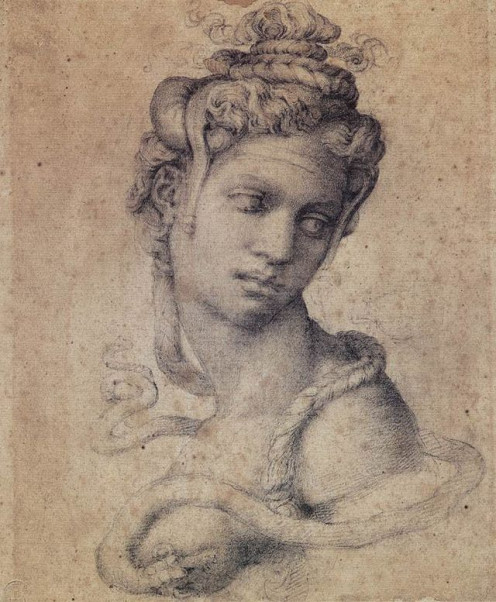
The Most Beautiful
The Egyptian queen, Cleopatra (69-30 B.C.), clearly had a thing for Romans; but this is not a story about Cleo. Caesar had a long lasting affair with the lady described by her age as incomparable. The affair, which lasted until Caesar’s death, produced a son, Caesarion (47-30 B.C). Caesarion was put to death by his cousin Octavian when he took over Egypt. The last thing the would-be Augustus wanted was any genuine Julian blood, illegitimate though it might be, floating about in Roman territory.
Brute or Patriot?
More intriguing, insofar as extramarital affairs are concerned, is the case of Brutus. There is some opinion that holds that Brutus was actually a son of Caesar, the result of a liaison with Brutus’ mother, Servilia Capeonis, several years earlier. At all events, Caesar certainly showed a clear preference for Brutus in comparison to the host of young men who flocked around him. The Bard has set in our minds the famous and you, Brutus? True enough; but contemporary accounts have two words added that the Bard omitted. My son. And you, Brutus, my son? If this be true, then Brutus was guilty not just of assassinating his head of government to whom he had sworn allegiance, he was guilty of parricide!
Then fall, Caesar!
So fell Caesar on that fateful Ides of March, 15th March, 44 B.C., and what a fall it was for Rome and for the world. In the premises of the Senate, the greatest Roman who ever lived was publicly assassinated by a group of senators who claimed that they feared that Caesar’s long-term intent was to overthrow the republic and re-institute a kingdom with himself as king! Some 60 or so men, chief amongst whom was Brutus stabbed and cut Caesar to death on the steps of the Senate. What a fall it was, when Caesar fell. It is ironic to note that the selfsame Senate had previously taken oath to protect and defend Caesar’s person. Politics as usual.


